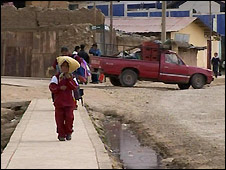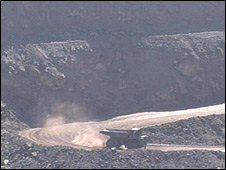Video: A look inside some of the Cinese mining operations in Peru.
Go to ORIGINAL
Article to see video.
Peru's 'copper mountain' in Chinese hands
June 17, 2008 - BBC News
By John Simpson
At 15,000 feet (4,600m), Mount Toromocho, 86 miles (138km) from Lima, is comparable to any mountain in Europe.
It gets its name from its shape - The Bull With No Horns. And it is composed almost entirely of copper ore: two billion tonnes of it.
It could become the most productive copper mine anywhere on earth. Now it belongs, in effect, to China.
When open-cast mining begins, in three or four years, a Chinese mining company, Chinalco, will send the copper back home to be turned into electrical wire.
The plan is to use it to carry out the electrification of the whole of China.
Bargain
The Peruvian government is happy with the $3bn (£1.53bn) that Chinalco will invest in the Toromocho mines.
The Chinese will be even happier. They have got themselves a bargain.
The copper Chinalco extracts from Toromocho will cost something like US$410 (£210) per ton. Today, the price for copper on the London Metal Exchange was $8,255 (£4,220) - 20 times more.
Chinalco stands to make a 2,000% profit on its investment.
 (right) Morococha town at the foot of Mount Toromocho. An entire town
is being moved to make way for the Chinese mine.
(right) Morococha town at the foot of Mount Toromocho. An entire town
is being moved to make way for the Chinese mine.
There is only one problem. In order to dig out the copper ore, the company will have to shift the inhabitants of an entire town, and move them across the valley.
Morococha is a poor and depressing place. Many of the inhabitants lead the most basic of lives. But that makes them all the more willing to accept the compensation which Chinalco is offering.
Two thousand dollars plus the promise of a small house or apartment is a powerful inducement if you live in a shanty with an open fire.
In a referendum last year, more than half of the inhabitants voted to accept.
Of the minority who voted against, some just wanted to be left alone where they have always lived.
Others felt that Chinalco was getting much too good a bargain. In other words, that Morococha's people were selling themselves short.
"What we're being offered for our houses is derisory," one of the organisers of the No campaign told us.
He wanted to drive a much harder bargain.
Perhaps, in the interests of harmony, the Chinese will offer more.
But not very much more. There are no other potential buyers. Chinalco has the field to itself.
That, in a way, is the problem for countries like Peru.
Cash offer
Of course they would like to get more for their raw materials. There is often an instinctive dislike of China's bargaining methods, and the high-handed way many Chinese companies operate abroad.
But there is no serious alternative. China is buying up raw materials all around the world, paying for its shopping spree with its vast reserves of foreign currency.
Often, as with Toromocho, the Chinese are successful because they can put the cash on the table. Three billion dollars is a very large amount of money for a relatively poor country like Peru.
 (right) Truck in a Chinese-owned open-cast mine in Peru
(right) Truck in a Chinese-owned open-cast mine in Peru
China has become a dominant player in Peru's mining industry
During his disastrous term in office from 1985 to 1990, President Alan Garcia set out to challenge the world's richest countries and the power of the big multinational corporations.
It was a disaster. As a result Peru went through a period of economic near-chaos.
Two years ago, surprisingly, he managed to get elected again - only this time he cuts a very different figure. He has become the friend of international business.
China offers Peru cash, and it is prepared to give Mr Garcia its political support. You can see why he would be interested.
Some Peruvians, just like the critics of Chinalco's offer to the town of Morococha, think President Garcia ought to get a better deal from the Chinese.
But Peru is not a rich country. He is perfectly pleased with the bargain the Chinese are offering.
So are the Chinese.